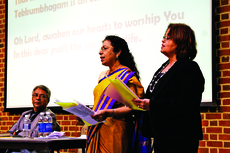
The lyrics were sung in an ancient language, unintelligible to the crowd, but those on hand to witness the performance by the Nirit Singers of Israel found themselves clapping in unison to the beat of the music.
The Nirit Singers were part of a panel of experts that convened in the Stamp Student Union on Sunday to present and discuss the folk songs of the Cochini Jews, a small, ancient community that lived in India for 2,000 years before migrating to Israel in the 1950s.
The panel of experts shed light on a subject that has seen an unexpected surge in interest in recent years due to a level of collaboration between scholars and performers that is not often seen in the world of academia.
“What made it so interesting was that there was such wide range of experiences displayed, from anthropologists to folklorists to the actual singers,” said Katherine Morehouse, a student who is seeking her doctorate in ethnomusicology.
The presentation was one of three in the Washington area and was brought to the campus by Saul Sosnowski, the associate provost in the university’s Office of International Programs, who helped coordinate the event.
“The songs come from a group within the Jewish community that we usually don’t hear about,” Sosnowski said.
During the event, two members of the Nirit Singers performed ancient Jewish women’s folksongs. These songs had been passed down from generation to generation in notebooks that, for decades, anthropologists have been working to track down and translate.
One of these anthropologists, Barbara Johnson, first began trying to locate the precious notebooks over 30 years ago. Along the way, there was no shortage of roadblocks.
“One of the problems was that people didn’t start collecting the songs until after Jews started moving to Israel,” said Johnson. “Some people took their notebooks with them, some didn’t.”
Further complicating the task was the fact that only the lyrics, never any melodies, were recorded in the notebooks. With no written records of the melodies, the researchers had to rely on generations of oral tradition to complete their knowledge of the songs.
The malleability of the songs in the hands of the performers made it even more difficult for researchers to pin down a definite composition for the music.
“I have seen humorous songs turn into weapons in the hands of improvisational singers,” said Smita Jassal, an anthropologist who was on the panel.
One thing that Johnson did not expect when she began collecting these notebooks of songs was the revival of interest that would come for the music of this small ethnic group. According to Johnson, the Nirit Singers can be thanked for this surprise.
“They’re the ones leading the revival,” said Johnson, who explained that the singers, by performing the folk songs, are giving a distinct voice to the ancient Jewish tradition in a way that would not be possible through strictly academic means.
“One thing I am pretty sure of is that our ancestors, the ones that took the time to write all these songs down, are looking down on us with big smiles on their faces,” said Zipporah “Venus” Lane, one of the Nirit singers who performed Sunday.
newsdesk@dbk.umd.edu



